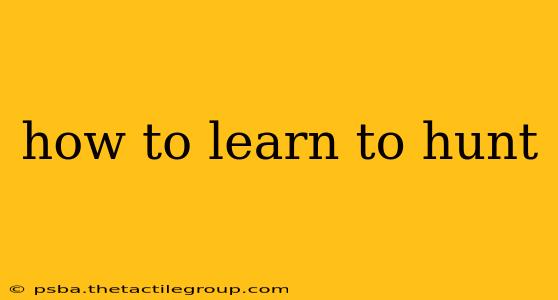Hunting is a challenging yet rewarding activity with a rich history and tradition. It demands respect for nature, ethical conduct, and a commitment to responsible firearm safety. This comprehensive guide outlines the steps to learn to hunt safely and ethically, ensuring you gain the skills and knowledge needed for a successful and fulfilling experience.
1. Understanding the Legal Framework and Ethical Considerations
Before you even think about picking up a firearm, familiarize yourself with the legal requirements in your area. Hunting regulations vary significantly by location and species.
Key Legal Aspects to Research:
- Licensing and Permits: Obtain the necessary hunting licenses and permits well in advance of the hunting season. These requirements often involve background checks and hunter safety courses.
- Hunting Seasons and Bag Limits: Understand the specific hunting seasons for the animals you wish to pursue and adhere strictly to the established bag limits. Overhunting is illegal and detrimental to wildlife populations.
- Land Ownership and Access: Respect private property rights. Always obtain permission before hunting on private land. Public lands often have their own regulations and requirements.
- Weapon Regulations: Familiarize yourself with the legal restrictions on firearms and ammunition. Some areas may restrict the use of certain calibers or types of ammunition.
Ethical Hunting Practices:
- Fair Chase: Practice ethical hunting techniques that ensure a clean and humane kill. This involves using appropriate weaponry and aiming for vital organs.
- Respect for Wildlife: Treat all animals, whether harvested or not, with respect. Avoid wounding animals and ensure a quick and humane dispatch.
- Conservation: Understand the importance of conservation and responsible hunting practices in maintaining healthy wildlife populations.
2. Mastering Hunter Safety
Hunter safety is paramount. Negligence can lead to serious injury or death, both to yourself and others.
Essential Steps:
- Complete a Hunter Safety Course: Most jurisdictions require hunters to complete a hunter safety course before obtaining a hunting license. These courses cover firearm safety, hunting ethics, wildlife identification, and first aid.
- Practice Safe Gun Handling: Develop and consistently practice safe gun handling techniques, including proper storage, transportation, and cleaning. Never point a firearm at anything you don't intend to shoot.
- Understand Your Weapon: Become intimately familiar with the operation of your chosen firearm. Practice loading, unloading, and firing your weapon in a safe environment under the supervision of an experienced hunter.
- First Aid and Emergency Preparedness: Learn basic first aid and emergency preparedness techniques. Be prepared for unexpected situations, including accidents and injuries.
3. Developing Hunting Skills
Hunting requires a blend of physical and mental skills.
Key Skills to Develop:
- Wildlife Identification: Learn to accurately identify the animals you plan to hunt. This is crucial for legal and ethical hunting. Utilize field guides and seek mentorship from experienced hunters.
- Tracking and Scouting: Develop your tracking and scouting skills to locate animals effectively. Learn to read animal tracks, signs, and behavior.
- Stalking and Shooting Techniques: Master appropriate stalking and shooting techniques for your chosen hunting method (e.g., still hunting, stand hunting, tracking). Practice shooting at various ranges and angles.
- Game Dressing and Processing: Learn how to properly dress and process your harvest. This includes field dressing, skinning, quartering, and meat preservation.
4. Seeking Mentorship and Experience
Learning to hunt is best done under the guidance of experienced hunters.
Finding Mentors:
- Join a Hunting Club or Organization: Connect with experienced hunters through local hunting clubs or organizations.
- Seek Advice from Family and Friends: If you know experienced hunters, ask for their guidance and mentorship.
- Attend Hunting Events and Workshops: Participate in hunting-related events and workshops to learn from experts and network with other hunters.
5. Respecting the Land and its Inhabitants
Hunting is a privilege, not a right. Always treat the land and its inhabitants with respect.
Responsible Hunting Practices:
- Leave No Trace: Minimize your impact on the environment. Pack out all trash and leave the area cleaner than you found it.
- Respect Other Hunters: Be courteous and respectful of other hunters. Maintain a safe distance and avoid interfering with their activities.
- Protect Wildlife Habitat: Support conservation efforts that protect wildlife habitats and ensure the long-term sustainability of hunting.
Learning to hunt is a journey that requires dedication, patience, and respect. By following these steps and continuously honing your skills, you can embark on a fulfilling and responsible hunting experience. Remember, safety and ethical conduct are paramount, always.

